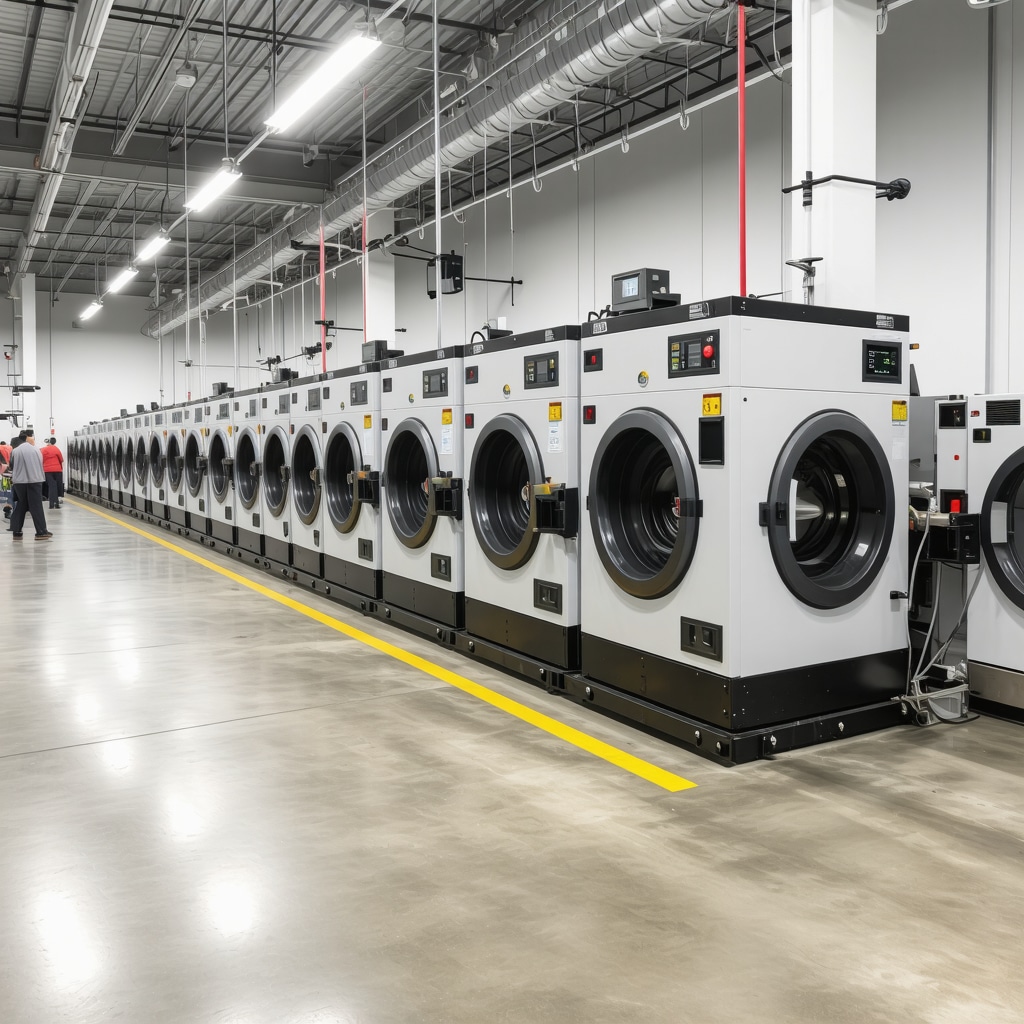Elevating Textile Maintenance: The Role of Professional Dry Cleaners in Trinity
In the intricate landscape of garment care, professional dry cleaners in Trinity stand as pivotal custodians of fabric integrity and longevity. Their expertise transcends basic cleaning, integrating advanced chemical processes and fabric science to preserve, restore, and enhance textiles. As consumer awareness grows regarding sustainable and precise garment maintenance, Trinity’s local experts exemplify a blend of traditional craftsmanship and innovative technologies, positioning themselves as trusted partners in textile preservation.
The Science Behind Expert Dry Cleaning Services in Trinity
Dry cleaning involves the use of specialty solvents, most notably perchloroethylene and increasingly, eco-friendly alternatives, to dissolve stains without water, thereby preventing fabric distortion. Trinity’s professional cleaners deploy tailored solvent blends and calibrated machinery to accommodate diverse fabric types—from delicate silks to robust wool coats—ensuring optimal treatment without compromising material properties. This scientific precision is often supported by fabric-specific protocols that reflect a deep understanding of textile chemistry.
How Do Professional Dry Cleaners in Trinity Manage Complex Garment Care Challenges?
Complex garment care in Trinity requires addressing multifaceted challenges such as stain composition variability, fabric sensitivity, and preservation of garment structure. Professionals employ expert stain analysis, leveraging enzymatic and solvent-based solutions to target intricate residues like oils, dyes, and particulate matter. Additionally, Trinity’s dry cleaners often provide integrated services including tailoring and restoration, which require nuanced skills to maintain garment fit and aesthetic post-cleaning. This comprehensive approach reflects an expert-level commitment to garment longevity and customer satisfaction.
Incorporating Eco-Friendly Practices Without Sacrificing Quality
Increasing environmental consciousness has prompted Trinity’s dry cleaners to adopt greener practices, such as using organic solvents and energy-efficient machinery, aligning with global sustainability standards. These eco-friendly innovations do not merely serve marketing purposes but are grounded in rigorous testing to ensure they meet or exceed traditional cleaning efficacy. Such practices position Trinity’s experts as leaders in responsible textile care, balancing ecological impact with high-performance cleaning.
Integrating Tailoring and Alterations: A Holistic Approach to Garment Care
Beyond cleaning, many professional dry cleaners in Trinity offer tailoring and alteration services, presenting a holistic garment care solution. This synergy allows for seamless transitions from cleaning to fit adjustments, preserving garment value and appearance. Expert tailoring services complement dry cleaning by addressing wear-induced changes, ensuring that garments maintain their intended silhouette and comfort.
Engage with Trinity’s Professional Dry Cleaning Community
For those seeking to deepen their understanding or share insights on advanced garment care, exploring specialized content on tailoring and fabric-specific cleaning methods can be invaluable. Engaging with local experts through forums or consultations can further enhance maintenance strategies and fabric preservation techniques. Visit the expert leather jacket cleaning tips here for in-depth guidance on specialized fabric care.
According to the Textile Institute’s latest research on sustainable dry cleaning methods (Textile Institute Technical Resources), integrating chemical proficiency with eco-conscious protocols significantly extends garment lifespan while minimizing environmental footprint, underscoring the critical expertise local Trinity dry cleaners embody.
Innovative Technologies Shaping Dry Cleaning in Trinity
The evolution of dry cleaning technology in Trinity has embraced cutting-edge innovations that redefine fabric care standards. State-of-the-art machinery equipped with digital sensors and automated solvent recycling systems optimize cleaning precision while minimizing waste. Additionally, advanced ozone-based and liquid carbon dioxide cleaning methods are increasingly employed by Trinity’s leading dry cleaners to achieve exceptional stain removal with reduced environmental impact. These technologies exemplify a forward-thinking approach, marrying efficiency with sustainability in garment maintenance.
What Emerging Technologies Will Define the Future of Dry Cleaning in Trinity?
Experts in textile care continuously explore the potential of nanotechnology, enzyme-based cleaners, and AI-driven fabric diagnostics to enhance dry cleaning outcomes. Nanoparticles can reinforce fabric fibers and confer stain resistance, while enzyme formulations target complex organic stains without harsh chemicals. Furthermore, AI systems enable personalized cleaning protocols by analyzing garment composition and wear patterns. Trinity’s professional dry cleaners are at the forefront of integrating these innovations, offering clients unparalleled garment care that anticipates and adapts to evolving fabric care challenges.
Expert Strategies for Maintaining Seasonal and Specialty Garments
Seasonal garments like wool coats, leather jackets, and delicate silks require specialized care to preserve texture and prevent degradation. Trinity’s professionals recommend tailored cleaning cycles aligned with fabric type and usage frequency, coupled with protective treatments such as waterproofing for outerwear and conditioning for leather. Understanding these nuanced requirements ensures that garments retain their aesthetic and functional qualities through seasonal transitions. For deeper insights into preserving leather jackets, visit expert leather jacket cleaning in Lutz.
Balancing Efficiency and Environmental Responsibility
Trinity’s dry cleaning sector exemplifies best practices in balancing operational efficiency with ecological stewardship. By adopting solvent recovery systems and biodegradable detergents, dry cleaners reduce volatile organic compound emissions and water contamination risks. These measures not only comply with environmental regulations but also enhance corporate social responsibility profiles. According to the Environmental Protection Agency’s guidelines on sustainable textile care (EPA Green Cleaning), such initiatives are vital for mitigating the environmental footprint of garment maintenance industries.
For expert advice on how to extend the life of your business wardrobe through professional care, consider exploring our detailed resource on suit dry cleaning service in Tampa.
Engage with the Community of Textile Care Experts
We invite readers and professionals alike to share their experiences and questions related to advanced garment care techniques. Engaging in informed discussions helps elevate industry standards and consumer knowledge. Feel free to comment below, share this article with fellow textile enthusiasts, or explore more expert topics such as organic dry cleaning methods in Lutz to deepen your understanding of sustainable fabric care.

Precision Fabric Diagnostics: The Next Frontier in Textile Care
Building on the foundation of traditional expertise, Trinity’s dry cleaning professionals are increasingly leveraging advanced diagnostic tools to customize fabric treatment plans. Spectroscopic analysis and microscopic fiber inspection allow for the identification of subtle degradations and contaminants invisible to the naked eye. These technologies facilitate the development of tailored solvent blends and enzymatic treatments that maximize cleaning efficacy while preserving the integrity of delicate fibers.
For example, Raman spectroscopy can detect residual oils and dye stability, informing the choice of non-reactive solvents that prevent color bleeding or fiber weakening. This precision approach elevates garment care beyond routine cleaning, transforming it into a scientific restoration process that proactively mitigates long-term deterioration.
How Do Spectroscopic Techniques Enhance Dry Cleaning Outcomes in Trinity?
Spectroscopic techniques provide a non-destructive analytical window into the molecular and structural composition of textiles. By identifying specific stain constituents and fiber conditions, Trinity’s experts can select solvents and treatment cycles that precisely target contaminants without overexposure. This reduces solvent usage and mechanical stress, thereby extending garment lifespan and improving customer satisfaction.
According to a 2022 study published in the Journal of Cleaner Production, integrating fabric-specific diagnostics with eco-friendly solvents significantly reduces environmental impacts while maintaining high-performance cleaning standards.
Advanced Enzyme Formulations: Revolutionizing Organic Stain Removal
Enzyme-based cleaners represent a paradigm shift in tackling complex organic stains such as blood, sweat, and food residues. Trinity’s dry cleaners are at the forefront of incorporating engineered enzyme cocktails tailored to specific fabric types and stain profiles. These enzymes catalyze the breakdown of stain molecules at ambient temperatures, circumventing the need for harsh chemicals or excessive heat that can damage sensitive textiles.
The precision of enzyme formulations also allows for biodegradability and minimal ecological disruption, aligning with Trinity’s commitment to sustainability. Furthermore, the synergy between enzyme action and solvent cleaning amplifies stain removal efficiency, particularly for proteinaceous and lipid-based residues.
Digital Workflow Integration: Optimizing Efficiency and Quality Control
Modern dry cleaning facilities in Trinity are adopting digital management systems that streamline operations from garment intake to delivery. These platforms incorporate AI-driven fabric recognition, automated solvent dosing, and real-time quality monitoring, ensuring consistent adherence to customized cleaning protocols. The integration of digital workflows reduces human error, accelerates turnaround times, and provides traceability for specialized treatments.
Moreover, customer interfaces equipped with mobile apps enable transparent communication regarding garment status and care recommendations, enhancing client trust and engagement. Such innovations position Trinity’s dry cleaning sector as a model of operational excellence combined with personalized service.
Collaborative Research and Development: Pioneering Sustainable Textile Care
Trinity’s professional dry cleaners actively participate in collaborative R&D initiatives with textile scientists, chemical engineers, and environmental experts. These partnerships foster the innovation of next-generation solvents, recyclable garment care materials, and closed-loop cleaning systems. By contributing to knowledge exchange and pilot projects, Trinity’s experts help shape industry standards that prioritize both fabric preservation and environmental stewardship.
Engagement in these cutting-edge developments ensures that local dry cleaners remain adaptive to emerging challenges such as microplastic release, solvent toxicity, and garment lifecycle extension.
What Are the Challenges and Solutions in Implementing Closed-Loop Solvent Recycling in Trinity?
Closed-loop solvent recycling systems capture and purify used solvents for reuse, significantly reducing chemical consumption and emissions. However, challenges include initial capital investment, maintenance complexity, and ensuring solvent purity to avoid fabric damage. Trinity’s leading dry cleaners address these by adopting modular recycling units with automated quality controls and partnering with technology providers for ongoing support. These solutions demonstrate a pragmatic balance between environmental benefits and operational feasibility.
For readers eager to explore the forefront of sustainable textile care, we recommend engaging with local expert workshops and technical seminars offered by Trinity’s professional networks. This engagement fosters deeper insight into advanced care methodologies and emerging ecological solutions.
Unveiling the Potential of Nanotechnology in Fabric Protection
Nanotechnology is rapidly emerging as a transformative force in textile care, offering unprecedented capabilities to enhance fabric durability and stain resistance. Trinity’s dry cleaning professionals are pioneering the integration of nanoparticle coatings that form invisible, breathable layers on garments, effectively repelling liquids and preventing dirt adhesion without altering fabric texture or breathability. These nano-coatings not only extend the lifespan of high-value textiles but also reduce the frequency of cleaning cycles, aligning with sustainability imperatives.
Artificial Intelligence: Tailoring Garment Care with Precision
The adoption of artificial intelligence (AI) in Trinity’s dry cleaning sector marks a paradigm shift in garment maintenance efficiency and customization. Advanced AI algorithms analyze comprehensive data sets encompassing fabric types, wear frequency, stain characteristics, and previous cleaning records to generate optimized cleaning protocols. This dynamic personalization ensures that each garment receives a bespoke treatment plan, minimizing chemical exposure and mechanical stress while enhancing cleaning performance.
How Does AI-Driven Fabric Diagnostics Revolutionize Dry Cleaning Practices in Trinity?
AI-driven diagnostics utilize machine learning models combined with high-resolution imaging to assess fabric integrity and contamination at a granular level. This technology enables real-time decision-making on solvent selection, cleaning duration, and mechanical agitation intensity. By continuously learning from accumulated data, AI systems improve over time, fostering adaptive garment care strategies that maximize preservation and client satisfaction. Trinity’s leading dry cleaners leverage these insights to offer unparalleled service sophistication.
According to a recent publication in the Nature Reviews Materials, the synergistic application of AI and nanomaterials in textile care represents a critical frontier that promises enhanced performance, reduced environmental impact, and superior consumer experiences.
Call to Action: Embrace Advanced Textile Care Innovations Today
For textile care professionals and discerning consumers in Trinity aiming to stay ahead of industry evolution, embracing these cutting-edge technologies is imperative. Collaborate with local experts to integrate AI diagnostics and nanotechnological treatments into your garment maintenance routines. Engage with upcoming workshops and seminars to deepen your understanding and application of these advancements, ensuring your textiles receive the highest standard of care now and in the future.

Expert Insights & Advanced Considerations
Precision Diagnostics as a Cornerstone of Modern Garment Care
Leveraging spectroscopic and microscopic fabric analysis empowers Trinity’s dry cleaning professionals to tailor solvent and enzyme applications uniquely to each textile. This precision minimizes chemical exposure and mechanical stress, thereby enhancing garment longevity and customer satisfaction in ways traditional methods cannot match.
Synergistic Integration of Enzyme Formulations and Eco-Friendly Solvents
The adoption of advanced enzyme cocktails, combined with environmentally responsible solvents, revolutionizes organic stain removal. This dual approach not only achieves superior cleaning efficacy at ambient temperatures but also aligns with sustainability goals by reducing chemical loads and energy consumption.
Artificial Intelligence Drives Personalized Textile Maintenance Protocols
AI-powered diagnostics and machine learning algorithms enable dynamic customization of cleaning cycles based on fabric type, wear history, and stain complexity. Trinity’s leading dry cleaners utilize these technologies to optimize resource use while delivering bespoke care that preserves fabric integrity and appearance.
Closed-Loop Solvent Recycling: Balancing Environmental Responsibility and Operational Viability
Implementing closed-loop solvent recycling systems addresses the critical need to reduce emissions and chemical waste. Despite challenges like initial investment and maintenance, Trinity’s experts demonstrate that modular, automated solutions can sustainably integrate into operations without compromising cleaning quality.
Nanotechnology as a Game-Changer in Fabric Protection and Longevity
Applying nanoparticle coatings creates invisible, breathable barriers that repel stains and dirt, effectively reducing cleaning frequency. This innovation not only enhances textile durability but also supports sustainability by lessening environmental impact through minimized solvent use and extended garment life.
Curated Expert Resources
- Journal of Cleaner Production: Offers peer-reviewed research on sustainable textile cleaning technologies and environmental impact assessments.
- Nature Reviews Materials: Provides insights into cutting-edge innovations such as AI and nanomaterials in fabric care, crucial for understanding future industry trends.
- Environmental Protection Agency (EPA) Green Cleaning Guidelines: Authoritative standards and best practices for eco-friendly garment maintenance and solvent management.
- Textile Institute Technical Resources: Comprehensive technical documentation on fabric chemistry and sustainable dry cleaning methods.
- Local Workshops and Seminars in Trinity: Opportunities to engage directly with textile care experts, fostering knowledge exchange and adoption of advanced techniques.
Final Expert Perspective
The landscape of dry cleaning in Trinity is evolving through the convergence of scientific precision, ecological mindfulness, and digital innovation. Expert dry cleaners are no longer mere service providers but pioneering custodians of textile longevity, employing advanced diagnostics, enzyme technologies, AI-driven customization, and nanotechnology to elevate garment care standards. Embracing these developments not only ensures superior fabric preservation but also positions Trinity’s professionals as leaders in sustainable and personalized textile maintenance. For those ready to deepen their engagement with next-level garment care or to collaborate with seasoned experts, exploring detailed insights on expert leather jacket cleaning in Trinity or connecting via direct consultation channels offers a valuable starting point to experience this advanced care firsthand.

Reading through this comprehensive overview of Trinity’s dry cleaning innovations, I am genuinely impressed by how much technology has transformed traditional garment care. The integration of AI diagnostics and nanotechnology, in particular, seems like a game-changer, offering both longer-lasting textiles and more sustainable practices. I’ve personally noticed that my delicate silk blouses last longer when treated with eco-friendly solvents combined with specialized enzyme cleaners, which aligns with some of the advances mentioned here. It makes me curious, though—how do local dry cleaners balance the costs of adopting such cutting-edge equipment with the need to keep services affordable for consumers? Has anyone experienced how these innovations affect turnaround times or pricing? I believe investing in these technologies not only benefits the environment but also enhances the quality of care, so it’s exciting to see Trinity leading the way. Would love to hear insights from professional cleaners on what challenges they face when integrating these new tools and how they see the industry evolving in the next few years.
This article really highlights how Trinity’s dry cleaners are blending traditional craftsmanship with cutting-edge technology. I’ve always appreciated that local shops offer tailored services, but seeing the integration of AI diagnostics, nanotechnology, and eco-friendly solvents truly elevates their capabilities. Personally, I’ve found that when my wool coats are cleaned with environmentally conscious methods, they tend to last longer and maintain their texture better. It makes me wonder, though—how do these advanced systems impact the cost for consumers? And are there particular challenges in training staff to use such sophisticated equipment effectively?
From my perspective, pushing for sustainability and technology is essential, but balancing it with affordability remains a challenge for many small businesses. It would be interesting to know how Trinity’s experts navigate these issues, especially when implementing innovations like closed-loop solvent recycling or AI-driven diagnostics. Have any of the local dry cleaners shared how these tech upgrades affect their operational costs or customer pricing? I’d love to see more discussions around making these advancements accessible while still maintaining high-quality care.
This article really underscores how Trinity’s dry cleaners are pushing the envelope in textile preservation and eco-conscious practices. I’ve noticed that many local shops are now incorporating enzyme-based cleaning solutions, which not only improve stain removal but also seem gentler on delicate fabrics like silk and wool. From my own experience, these advanced methods have definitely extended the lifespan of my high-quality garments, which is a big win for sustainability—less frequent replacements mean less waste. However, I wonder how these innovations impact the overall price for consumers, especially for specialty items that require more delicate handling? It would be interesting to hear from professional dry cleaners about how they balance technological advancements with affordability for their clients. Additionally, I’m curious if these high-tech solutions have shortened turnaround times or if they require more extensive training for staff. As the industry evolves, do you see these sustainable innovations becoming standard across all service levels in Trinity?